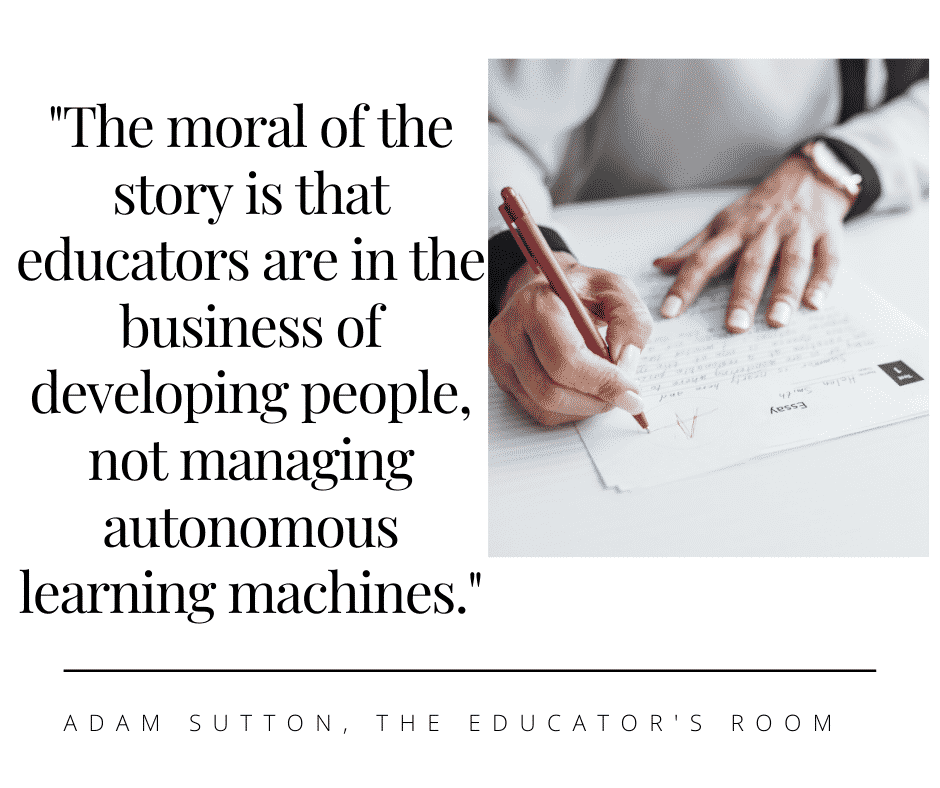For those unaware, standards-based grading is a popular evaluation system designed to simplify teaching, learning, and assessment. It strips a student’s grade down to their ability to meet the announced standards. The idea is that students will learn more easily if teachers grade based upon very explicit and clear standards. Moreover, by standardizing the grading process, each student, regardless of the teacher, will be graded identically, thus, eliminating bias and preferential treatment.
To be fair, there are several worthy components to standards-based grading. It eliminates the opportunity for affluent, well-resourced students to improve their grades by providing classroom tissue boxes for extra credit; it ends petty, frivolous concerns like frilly edges of paper influencing grades, and it helps teachers focus their instruction. Still, standards-based grading must die.
[bctt tweet=”Still, standards-based grading must die” username=””]
The devoted standards-based graders insist that done right the learning process becomes so clear and concise that students simply fall in love and eagerly consume the standards. This might happen, but it’s not the standards the kids care about. It’s their teacher, investing herculean amounts of time into their students, that they care about.
Standards-based grading doubles down on the belief that education is a destination. A student’s value is determined by their product. It treats education as a cul de sac ignoring the connecting street. The hope is to level the playing field, but it doesn’t.
In reality, adhering to standards-based grading with fidelity is counterproductive and leads to a lowering of expectations. I’m thinking specifically about Carlos. I taught Carlos in an elective class in the fall of his 11th-grade year. Carlos and I hit it off, and he did really well; I wanted him in my AP Economics class the following year.
Carlos was on no one’s list to be in an AP class, but I introduced the idea. He scoffed. I persisted, and after a series of months, I convinced him to try it. If I had followed a strict rule of following standards and prerequisites, Carlos would have never seen any AP class.
In light of that, he wasn’t ready for that first AP assessment the following year. He didn’t have a true appreciation for what was coming. Despite all our preparations, he wasn’t quite there.
So, as I graded Carlos’ first assessment, I could have stuck to the standards. I would have crushed him. And, since Economics is a graduation requirement in my state, very easily, I could have pushed him to drop AP Economics. Adherence to the standards wouldn’t have made him better off. So, I fudged it a bit. He didn’t get an A, but he didn’t fail either. He stuck around–earned a 2 on the exam–and kept working harder than he ever had.
[bctt tweet=”The moral of the story is that educators are in the business of developing people, not managing autonomous learning machines.” username=””]
The moral of the story is that educators are in the business of developing people, not managing autonomous learning machines. For Carlos and other students, it’s not about taking AP classes, or the standards of any class. Those are not the measure of a kid or school’s value. Teaching and learning is a process of pushing into uncharted territory, and that doesn’t happen because the standard is foremost. It happens because the kid is.
For those inclined to think Carlos would have been better served in a standard Economics class because it fit his zone of proximal development better, maybe? But, this attitude flies in the face of consistent research that indicates the single biggest factor in a student’s learning is the teacher. Arrogantly, I was best positioned to teach Carlos Economics that year, no matter the level of rigor of the standards. And, to quote Carlos, he “appreciated the effort [I] put into teaching.”
The learning process is defined by the people involved in it, not the standards being studied.
But, let’s not get muddled in Carlos and I because this is a story that extends beyond one teacher and one student. If we want to measure student–and teacher–success by standards and ability to demonstrate knowledge, fine. That’s what standardized testing is for. However, relying on such exams to judge the learning process makes many bristle. Imagine that instead of a once or twice a year occurrence, the mentality of the standardized test was cemented as an everyday occurrence. Even though standards-based grading cloaks itself in the language of equity and fairness, that’s what standards-based grading seeks to achieve: a daily version of the standardized test.
[bctt tweet=”The problem with education is not that we lack standardization; it’s that we have too much. ” username=””]
Learning is an endless, lifelong process. There are no exams outside of school. Once students leave school, the test is whether or not they can navigate the process of confronting a new problem, gathering information to understand and solve the problem, evaluating that information, and executing the best solution. It’s a process. Standards-based grading ignores the process, which means standards-based grading must die.







You couldn’t be more wrong about the intentions, the methods and the effect of SBG. Starting with the second line, “The idea is that students will learn more easily if teachers grade based upon very explicit and clear standards.” you begin to set up a straw man that you use to paint a false narrative about SBG. That is NOT the “idea” behind SBG. The idea is that if we establish some clear learning goals, we can report meaningful learning. SBG isn’t designed for motivation, although it does provide it. It’s designed for honesty in reporting.
And no, kids in SBG classrooms don’t get discouraged and drop out of challenging classes because of SBG. They are instead encouraged to revisit their learning and try again, because their grade is not based on some arbitrary time cut off for learning. It’s based on how much they learn.
And no, no, no, no SBG is not “the standardized test … cemented as an everyday occurrence.” Nothing about SBG resembles standardized testing. It’s personal, it’s criterion-referenced, it depends on the teacher-student relationship.
But you saved the worst for last. “Standards-based grading ignores the process,” is so utterly false that it makes me wonder how you ever felt you had the authority to write on this subject, since you clearly don’t understand SBG. SBG is ALL about the process. Teachers who use traditional grading look for right answers and adherence to the norms they taught in the lessons. As an SBG teacher, when I grade I am thinking deeply about how the student arrived at the answer and how that though process does or doesn’t meet the standard and then the student and I have a conversation about where their thinking might shift to master the learning target. And many, many, many times as an SBG teacher, I’ve rated a student as proficient who got a wrong answer because nearly every meaningful learning standard is written in terms of process. So a silly mistake that has nothing to do with the standard can be easily ignored with no lack of integrity.
Unfortunately, a link to this article has been posted by Peter Greene and hordes of teachers are going to come read this and think what you are describing is SBG. That’s sad. Stick you what you know.
Good on you Dave I am also worried about the Peter Greene effect here. Too many folks in ed. are just too tired to separate out the wheat and chafe. Pete are you
Listening? Did you do your due diligence at least run it by Diane et. al.?
By your comments, you seem well informed on the SBG practice, but my biggest concern is that SBG is very subjective because of all of the considerations we have to allow for. How would you address this issue?
I disagree. SBG can be effective, but it has some serious flaws. As a teacher who has seen this forced into the high school classrooms, it can fail miserably if the student gives up. Many students believe that if they fail once, they will fail repeatedly. So instead of continuing to try, they give up. When this happens, SBG falls like a house of cards.
Don’t misunderstand me. SBG has SOME merits. But when it is forced down the throats of the teachers and students, it only sets up a culture of defeat and hatred of educaion.
Well said – you don’t mince words. I never quite believed that those who develop the standards are teachers…or include them in the decisions about what happens in a classroom. Thanks for posting this!
Maybe I’m missing some context here, but I don’t think understand how this anecdote supports your argument. When Carlos demonstrated growth but fell short of mastery, you rightly recognized mastery as a “destination” and gave him a middling grade. He went on to earn a 2 on the exam. Then he, having internalized your message that mastery is a destination, “kept working harder” to get there.
This almost sounds like an argument *for* standards-based grading. Many teachers I know working under the traditional grading system would have given Carlos an A for effort even though he had a long way to go toward mastering the content (inevitably setting him up to bomb the exam). Under a well-implemented SBG system, there should be less pressure to artificially inflate grades because the focus is on getting the student toward mastery rather than counting everything toward a big meaningless average at the end of the term.
The subtext here seems to be that your admin asked you to apply standards in a way that would have hurt kids, and you refused to do it. Good for you! But I am not sure it has much to do with SBG as a broader concept, unless I’m just ignorant of some important background info.
Standards Based Grading turns learning into a game for too many students. Combine that negative with poorly written and/or subjective standards, and the required (unsustainable) intensity and you have a recipe for SBG failure, soon to be found on the smoldering ash heap of unworkable edu-babble.
I had a chuckle here: “…turns learning into a game…” Assessment and grading will always be a game, regardless of the method of grading and reporting; it’s just a question of whether the game is worth playing. To me, the game of identifying meaningful goals and continuing to work until you achieve them is preferable to the game of expecting proficiency in one skill set to compensate for non-proficiency in another.
SBG is not about standardization of how or what you teach. It’s about how achievement of learning is reported so that it reflects knowledge and ability in a clear and accurate way. Traditional grading averages out performance in a way that obscures what topics were learned, and how well they were learned. Say for example that Carlos got a 73% over the course of the semester, no one, not even his teacher, could explain what that score means about what Carlos learned. Not without pulling out all the tests and projects and analyzing them. SBG reports proficiency scores on those skills directly so when someone looks at the grade earned they can actually speak directly about what specific skills have been learned. It’s about the grade directly communicating on learning outcomes. Nothing else changes, just how learning is reported during the grading process.
This is not true. My students can explain their grades to me without SBG. Since I’ve been a teacher, with precious few exceptions. Part of my annoyance with this grading system is the assumption that students and teachers are all complete idiots. If you clearly communicate what you want your students to do and help them achieve those learning goals with clear communication with each individual student (treating them like the INDIVIDUALS they are), they will successfully learn what you’re hoping to learn and a few things you didn’t even count on. As long as they’re putting forth the effort. One problem many have noticed with SBG is that students don’t put as much effort in as they did before. Lots of places have tried it and dropped it. This is the true test. It doesn’t have staying power.
This is not what they do in public schools in countries that have more successful education systems. It might pay for the United States to put that “greatest country in the world” egotism aside and find out what those more successful countries are actually doing.
SBG is just an EdTech initiative to make money for industry. That is not a good reason to implement anything.
I’ll just echo.what others have said. You so completely miss the mark about what SBG is, I have to wonder if you researched it at all (which is worrisome for someone who teaches AP level courses).
Still, a nice flamebait piece that should pad your blogging career, which you seem to take more seriously than your teaching career as evidenced by your willingness to share a student’s personal info.
Dave, when you get insulting flak like this, it’s typically coming from vested interests. It’s a social media PR tool.
Adam, when you get insulting flak like this, it’s typically coming from vested interests. It’s a social media PR tool.
Bravo. Brave post! Keep up the good work.
I think SBG has a place in education. Working in career and technical education it makes a lot of sense to use standards based grading for assessing students. Graduates from those types programs need to be compitent in the specific trade skills taught. Assigning a percentage grade does not really help an employer know if a student can do a job or not. I don’t think standards based grading is a good idea for traditional education classes like math and English because it enables lowering standards to get more students to pass giving a false impression.
I’m late to the party, so maybe I’m alone in this Comment Room. As a 9th Grade Graduation Mentor, I have a different take on Standards Based Grading System. I find Standards Based Grading for at-risk 9th through 11th grade students to be a lose-lose-lose situation. For 12th graders, it’s a lose-lose-lose-win situation, with the win, that is, graduation, pulled out during the last month of school. My 9th graders learn quickly that they needn’t complete every assignment. In fact, their teachers stop insisting they complete the assignment, as the class has moved on to the next Unit, with its accompanying assignment. “Students have another chance at this or that Standard,” they tell me, “so no need to ask them to complete the previous one.” By the end of the semester, many of my students–low SES, low academic skills, smart and capable in many ways–have completed few to no assignments. Teachers give the final assignment that includes enough Standards for my students to pass the class, as long as teachers see evidence of “Nearing Proficiency”. Some students, generally not my students, earn a “Proficiency” or “Exceeding Proficiency” mark at this point after completing few prior assignments. Back to the Three Loses. Lose #1: students do not learn the importance of completing assignments, Lose #2: students do not learn the material the assignments and teacher feedback were designed to help them learn, and Lose #3: students move on to the next grade unprepared. The 12th grade Win is that in the end, after little effort and little learning, at risk students graduate. Diploma in hand, student are happy, friends and family are happy, the school is happy, the school district is happy, and the state Department of Education is happy. In sum, Standards Based Grading System makes it too easy and too tempting to push my students through the system and out the door without the education we paid for and they deserve.
Revised and edited comment:
As a 9th Grade Graduation Mentor, I have my own take on the Standards Based Grading System. Standards Based Grading for at-risk-of-not-graduating students creates a lose-lose situation. For at-risk-of-not-graduating students nearing the end of their senior year, it’s a lose-lose-win situation, one I will explain later. At-risk-of-not-graduating 9th graders learn quickly that they needn’t complete every assignment. In fact, their teachers stop insisting they complete past assignments once the classes move on to the next Unit. “Students will have other chances to hit this or that Standard,” teachers assure me, “so no need to complete previous assignments.” By the end of the semester, many at-risk-of-not-graduating students have completed few to no assignments. Teachers then give their final assignments, ones that include enough Standards for at-risk-of-not-graduating students to pass, as long as teachers see evidence of “Nearing Proficiency”. Some students, generally not the at-risk-of-not-graduating students, earn a “Proficiency” or “Exceeding Proficiency” mark at this point. As I stated earlier, it’s lose-lose: at-risk-of-not-graduating students do not learn the importance of completing assignments, and they do not learn the material. The 12th grade lose-lose-win situation reflects how in the end, after little effort and after little learning, at-risk-of-not-graduating students graduate. Diploma in hand, students are happy, friends and families are happy, the school is happy, the school district is happy, and the state Department of Education is happy. And yet. I question the value of their Diploma; I question what their high school transcripts communicate versus what they hide. In sum, the Standards Based Grading makes it too easy and too tempting to push my students through the system and out the door without the education our society promised them.
Q1a: Are your assessments rooted in genuine learning in your subject (ex: effectively employing the writing process for an essay), and not in superficial elements (such as attire… in a Maths class)?
Q1b: Are these learning requirements pertinent skills that will be assessed, for a mastery grade, for your subject?
Q2: Can students and families easily access and communicate how to demonstrate mastery of your responses for Q1a/b?
——
If your answers to the above questions are YES, then keep doing what you’re doing. You’ll outlast any grading “fad” or pop-pedagogy in your long career as a valued educator.
If SBG was what you have described it to be…then I would agree with you that it isn’t a good grading/assessment philosophy. However, you completely misrepresent what SBG is in your post. The problems with SBG are not with the philosophy, but with botched or partial implementations. When you only apply some of the components, without properly implementing all of them…it will collapse and be ineffective. But when done properly, SBG is a wonderful way to promote learning and stay focused on the learning objectives. I suggest you look more into SBG before you make some of the assumptions you wrote about.